|
|
|
Sort Order |
|
|
|
Items / Page
|
|
|
|
|
|
|
| Srl | Item |
| 1 |
ID:
165026
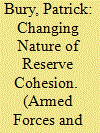

|
|
|
|
|
| Summary/Abstract |
For too long military cohesion scholars have focused on regular infantry forces. This article examines the impact of the Future Reserves 2020 (FR20) policy on cohesion, professionalism, and discipline among British reserve logisticians. In doing so, it makes three significant contributions to the cohesion literature. Firstly, addressing scholars’ almost exclusive focus on regular infantry, it presents the first academic study on cohesion in British reserve logistics forces. Secondly, in detailing how cohesion in these forces is based on interpersonal rather than professional bonds, it argues that the locus of cohesion and discipline in these forces is different to that recently identified in the regular professional infantry. Thirdly, the article argues that while FR20 is gradually changing many of British reserve norms, the organizational realities of reserve service continue to limit the policy's impact. The evidence presented may be theoretically applicable to other reserve and noncombat forces in future cohesion research.
|
|
|
|
|
|
|
|
|
|
|
|
|
|
|
|
| 2 |
ID:
165044


|
|
|
|
|
| Summary/Abstract |
After the end of the Cold War, many European countries cut back so heavily on defense expenditure that they lost their capacity to defend themselves. This resulted in greater need for improved cooperation and interoperability among member states’ armed forces. One important attempt to improve the understanding and interoperability among the European Union (EU) nation’s armed forces was taken in 2008 by the creation of the European Initiative for exchange of young officers aimed to make the officer education in Europe more transparent and convergent with each other. This article presents a proposal for a generic pedagogic model for an academically professional officer education that can improve understanding and interoperability among the EU nation’s armed forces. The model helps to facilitate a process of professionalization of the military profession with an officer education that can meet the requirements of higher education systems as well as the demands of the military profession.
|
|
|
|
|
|
|
|
|
|
|
|
|
|
|
|
| 3 |
ID:
165024
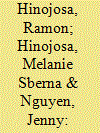

|
|
|
|
|
| Summary/Abstract |
There are 22 million veterans in the U.S. Armed Forces. Past research on the musculoskeletal health of military veterans has explored the prevalence of musculoskeletal disorders (MSDs) but largely avoids situating findings within a theoretical framework. This article uses Pierre Bourdieu’s theory of cultural capital to contextualize veteran’s greater rates of MSDs compared to nonmilitary civilians. Cultural capital consists of objectified, institutional, and embodied capital that can be transubstantiated to capital in other areas. Embodied or physical capital is central to military service, and military veteran status is beneficial in accessing social and institutional capital. Using the 2012–2014 National Health Interview Survey, we show veterans are more likely to report activity-limiting MSDs, and at younger ages, compared to nonveterans. Physical capital is central to, and impaired by, status as a veteran.
|
|
|
|
|
|
|
|
|
|
|
|
|
|
|
|
| 4 |
ID:
165046


|
|
|
|
|
| Summary/Abstract |
Green-on-blue attacks have a devastating psychological, tactical, and operational effect on military operations in Afghanistan. In spite of this, no empirical research has offered a data-driven examination of these attacks, leaving a gap that this article aims to address. By analyzing a large (yet inevitability incomplete) open-source database developed on these attacks, we present data on the perpetrators and victims of these attacks. We also investigate whether green-on-blue attacks are related to the number of civilian casualties in that area; finding that (unlike wider insurgent violence) they are not. Instead, we find that it is the number of troops present within a Regional Command that is positively correlated with the likelihood that a green-on-blue attack will occur. We discuss the implications of these findings with reference to future issues of force protection.
|
|
|
|
|
|
|
|
|
|
|
|
|
|
|
|
| 5 |
ID:
165022
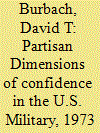

|
|
|
|
|
| Summary/Abstract |
Americans express more confidence in their military than any other institution. The components and causes of confidence have been little studied, especially as a partisan phenomenon. This study assesses trends in how partisanship and ideology affect confidence in the military. Multivariate analysis of General Social Survey and Harris Poll data shows that while confidence has increased for all demographic and political subgroups, partisanship and ideology play larger roles than commonly recognized. Democrats and Republicans are more confident than independents, but Republican confidence increased sharply over the last 20 years. Party ID is now the best predictor of one's confidence in the military. Conservative ideology has little effect, but liberalism reduces confidence, splitting Democrats. The pattern is not only “Republicanization,” however; partisans on both sides are more confident when their party holds the White House.
|
|
|
|
|
|
|
|
|
|
|
|
|
|
|
|
| 6 |
ID:
165045
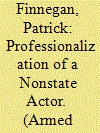

|
|
|
|
|
| Summary/Abstract |
Can nonstate militants professionalize? That is the core question of this piece. Discussions of professionalism have spread to the state military from civilian professions such as education, medicine, and law. This piece examines whether nonstate actors exhibit the same fundamental processes found within these state-based organizations. These fundamentals are the creation of a recognized internal ethos, which acts as a collective standard for those involved. A commitment to expertise and the punishment of those who do not reach these collective expectations reinforce this ethos. To answer this question, this piece examines the development of the Provisional Irish Republican Army (PIRA) during the Troubles. It highlights consistencies and inconsistencies with traditional forces and argues that groups like the PIRA can professionalize and increase their effectiveness in doing so. This widens the field of professionalism studies and provides an additional lens through which to examine nonstate groups.
|
|
|
|
|
|
|
|
|
|
|
|
|
|
|
|
| 7 |
ID:
165025
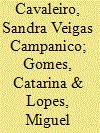

|
|
|
|
|
| Summary/Abstract |
This study tested the moderation effect that leader support had on the relation between a family-supportive work environment (FSWE) and work–family conflict (WFC) in the Portuguese Navy. Data were collected through the application of a questionnaire to 260 career Navy junior and senior officers. Results indicated that a positive relation existed between the FSWE and WFC, being so that more FSWE related to more WFC. When bringing leader’s support to the subject, the only relation found was between leader support and WFC in which less leader support related to more WFC. The results didn’t back up the hypothesis that leader support had a positive moderating impact on the relationship between an FSWE and WFC. Given this, the results are discussed considering the theory on WFC and possible implications for future research and practice are presented for the Portuguese Navy.
|
|
|
|
|
|
|
|
|
|
|
|
|
|
|
|
| 8 |
ID:
165023
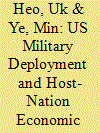

|
|
|
|
|
| Summary/Abstract |
Since the end of World War II, the U.S. military has deployed its troops all over the world for regional security and/or peace building. Despite the importance of its political, economic, and military impact on the region, few studies examined how U.S. military deployment overseas affects the host nation’s economy except Jones and Kane (2012) and Kane (2012). To help fill the gap in the literature, we tested how substantial U.S. troop deployment (more than 100 troops on average) affects the host state’s investment, trade, political development, and economic growth for the period from 1960 to 2014, using the seemingly unrelated regression (SUR) model. The results show that the presence of U.S. troops does promote investment, trade, and economic growth in the host state. The United States deploys troops for regional security purposes, but these deployments also help economic growth directly and indirectly.
|
|
|
|
|
|
|
|
|
|
|
|
|
|
|
|
|
|
|
|
|